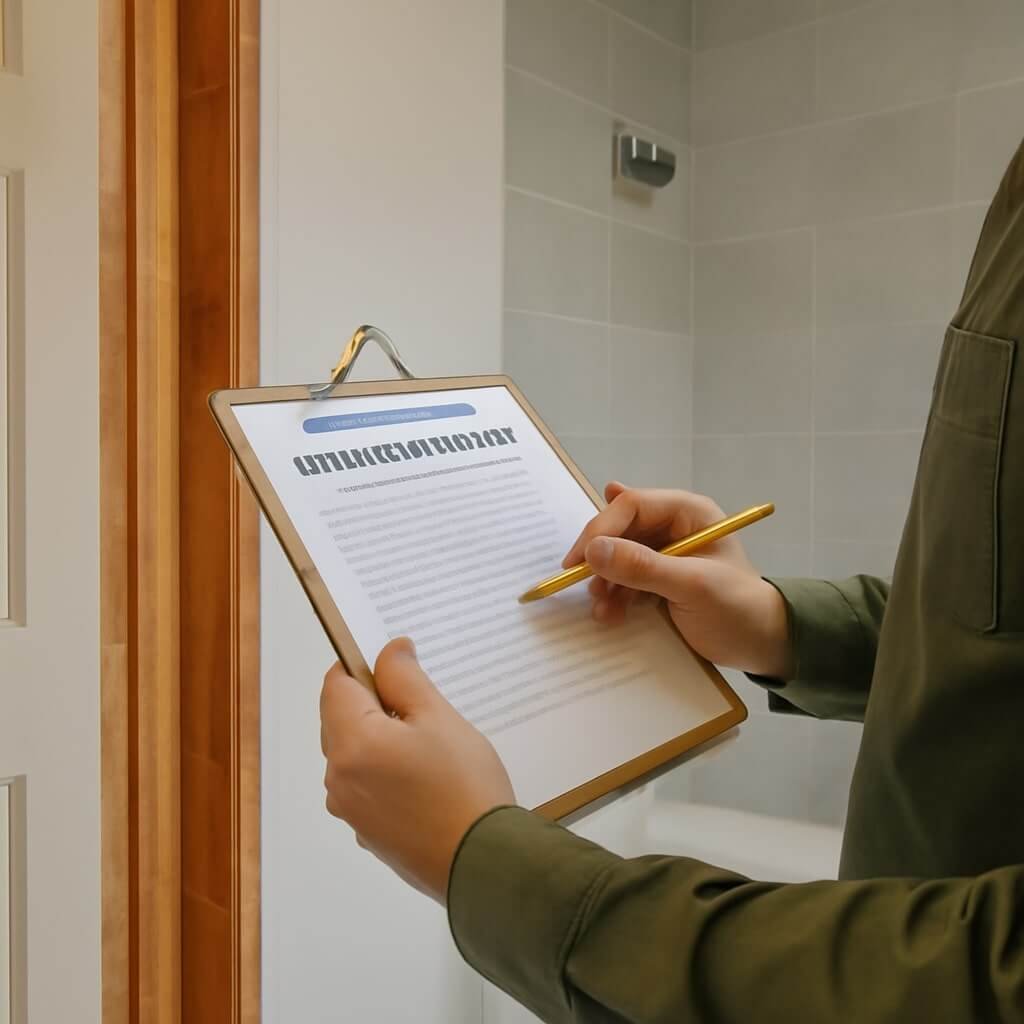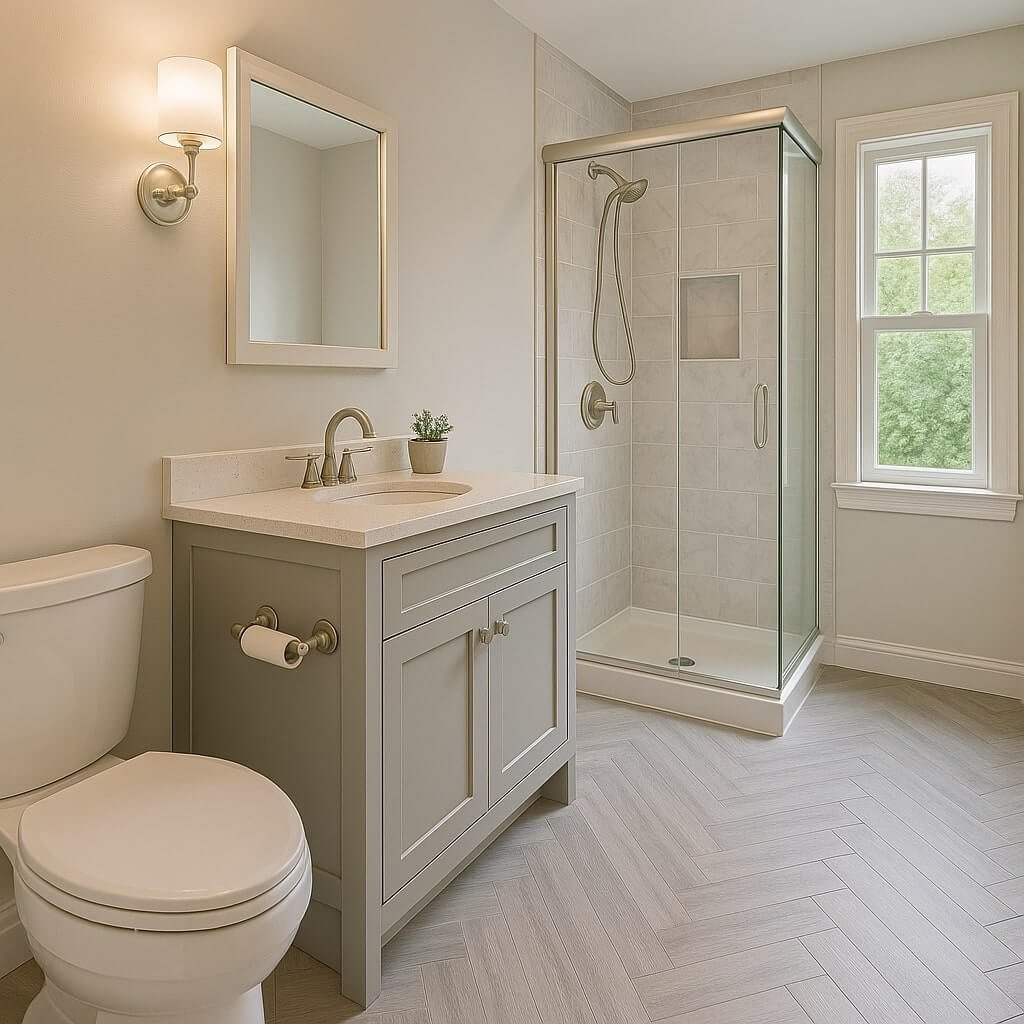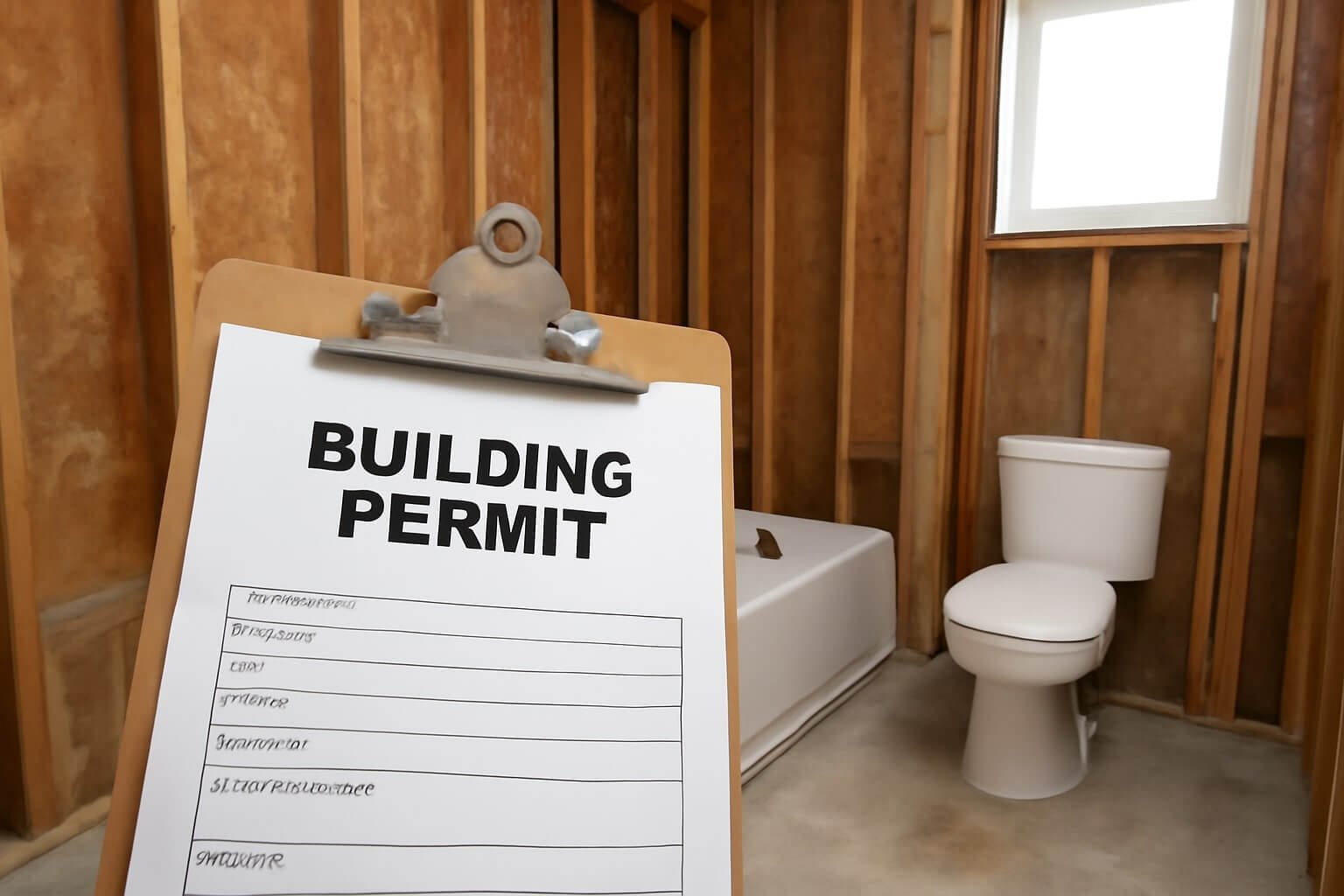When you’re planning a bathroom remodel, understanding permits is essential. You might think it’s just a simple project, but permits can make or break your renovation. Certain changes, like installing new plumbing or electrical fixtures, often require official approval. If you’re unsure about what’s needed, you could face unexpected delays. Let’s explore the types of permits you may need, and how to navigate the application process effectively.
Key Takeaways
- Check local regulations to determine if your bathroom remodel requires permits, focusing on structural, plumbing, and electrical changes.
- Obtain plumbing permits for new fixtures or modifications to existing plumbing systems to ensure compliance.
- Secure electrical permits to verify that any wiring installations meet safety codes and local standards.
- Plan for potential delays in the permit application process, which can take days to weeks depending on your location.
- Familiarize yourself with zoning laws and building codes in your area to avoid issues during inspections and approvals.
Understanding the Basics of Bathroom Remodel Permits
When you’re planning a bathroom remodel, understanding the basics of permits is crucial, as it can save you time and headaches down the line.
Permit basics involve knowing what modifications require approval, which can vary by location. Generally, structural changes, plumbing, and electrical work will likely need permits.
Understanding which modifications require permits is essential, as regulations can differ by location. Structural, plumbing, and electrical changes typically need approval.
Failing to obtain necessary permits can lead to fines or complications in your renovations. Before diving into your project, check local regulations to guarantee you’re compliant.
This proactive approach not only streamlines your bathroom renovations but also assures that your new space is safe and up to code, giving you peace of mind.
Types of Permits Required for Bathroom Renovations
Before you start tearing down walls or swapping out fixtures, it’s important to know the types of permits you might need for your bathroom renovation.
Common permit types include plumbing, electrical, and building permits. Plumbing permits are often required for new fixtures or alterations to existing plumbing. Electrical permits verify your wiring meets safety codes, especially if you’re installing new lighting or outlets.
Building permits might be necessary for structural changes, like removing walls. Always check local renovation guidelines to confirm you’re compliant with regulations, as requirements can vary considerably.
Being informed helps you avoid costly fines and delays down the line.
Determining When You Need a Permit
Are you unsure whether your bathroom remodel requires a permit? Understanding when you need one is essential.
Generally, permits are needed based on the renovation scope and local regulations. However, there are permit exemptions.
Permits are often required for renovations, but some projects may be exempt based on local regulations.
Here are some key factors to take into account:
- Structural changes (like moving walls)
- Electrical or plumbing upgrades
- Alterations to ventilation systems
- Significant changes in layout
- Cosmetic updates (often exempt)
Before you start, check with your local building department to clarify requirements.
It’ll save you time and headaches later on. Knowing when a permit is necessary can keep your project on track and legally compliant.
The Permit Application Process
Understanding the permit application process is crucial for a smooth bathroom remodel, as it can greatly impact your project’s timeline and budget.
Start by gathering necessary documents, like plans and specifications. Then, submit your application to the local building department.
Be aware of permit timelines; processing can take anywhere from a few days to several weeks, depending on your area.
Don’t forget about application fees, which can vary widely.
Planning ahead and being prepared will help you navigate this process efficiently, keeping your project on track and within budget.
Stay proactive to avoid unnecessary delays and costs.
Common Challenges Homeowners Face With Permits
When you’re remodeling your bathroom, you’ll likely run into some common challenges with permits.
Understanding local regulations and steering through the application process can be tricky, and you might also face delays and compliance issues along the way.
Understanding Local Regulations
Maneuvering through local regulations can feel overwhelming, especially for homeowners enthusiastic to begin their bathroom remodel.
Understanding zoning laws and building codes is essential to avoid costly mistakes. Here are some common challenges you might face:
- Confusing terminology in local regulations
- Variations in building codes between municipalities
- Zoning laws affecting layout and design
- Lack of clear information on permit requirements
- Potential delays in project timelines due to compliance checks
Navigating Application Processes
How do you navigate the often confusing application process for bathroom remodel permits?
Start by gathering all necessary documents, including design plans and contractor information.
Application tips include double-checking your local regulations to guarantee compliance.
Be mindful of permit timelines; they can vary considerably between jurisdictions.
Submitting your application early can save you from unexpected delays.
If you encounter questions or issues, don’t hesitate to reach out to your local permitting office for clarification.
Staying organized and proactive can make the process smoother, allowing you to focus on your exciting bathroom remodel rather than getting bogged down in paperwork.
Delays and Compliance Issues
Even with careful planning, delays and compliance issues can arise during the bathroom remodel permit process.
Here are some common challenges you might face:
- Permit delays due to incomplete paperwork
- Miscommunication with local building departments
- Inspections that reveal code violations
- Changes in local regulations that affect your project
- Unexpected costs from required modifications
Staying organized and informed can help you navigate these compliance challenges.
Confirm your documents are thorough and maintain open communication with officials. This proactive approach can reduce frustration and keep your remodel on track!
Tips for a Smooth Permit Approval
To get your bathroom remodel permit approved smoothly, start by researching your local regulations; each area has its own rules.
Next, make sure you prepare all required documentation thoroughly to avoid any delays.
Research Local Regulations
Before diving into your bathroom remodel, it’s crucial to understand the local regulations that govern permit approvals. Researching these will save you time and frustration later.
Here are some key points to take into account:
- Check local building codes to guarantee compliance.
- Investigate permit application fees in your area.
- Understand the timeline for permit approvals.
- Look for any specific zoning laws that may apply.
- Confirm whether inspections will be required during construction.
Prepare Required Documentation
Once you’ve familiarized yourself with local regulations, the next step is to gather the necessary documentation for your permit application.
Start with detailed plans of your remodel, including layout and materials. You’ll also need to compile your property deeds and any previous permits related to your home.
Don’t forget to include contractor licenses if you’re hiring help. Proper document preparation can make or break your approval process, so guarantee everything’s clear and organized.
Double-check your paperwork for accuracy, as missing or incorrect information can delay your project.
With thorough preparation, you’ll be well on your way to securing that permit!
Consequences of Skipping Permits
While it might be tempting to skip obtaining permits for your bathroom remodel, doing so can lead to significant consequences.
You risk facing:
- Legal ramifications: Unauthorized changes can result in fines or forced removal.
- Financial penalties: Local governments may impose hefty fees for non-compliance.
- Insurance issues: Your policy mightn’t cover damages from unpermitted work.
- Home resale problems: Buyers often expect proper permits, affecting your home’s value.
- Safety hazards: Unpermitted work may not meet code, putting your family at risk.
Ultimately, it’s smarter to invest time in permits than deal with these avoidable headaches later!
Conclusion
Maneuvering bathroom remodel permits can feel intimidating, but staying informed makes it manageable. By understanding the types of permits you might need and preparing for the application process, you can avoid common pitfalls and delays. Don’t underestimate the importance of compliance—skipping permits may lead to costly consequences down the line. With careful planning and attention to local regulations, you can guarantee your bathroom renovation goes smoothly and turns out just as you envisioned.




